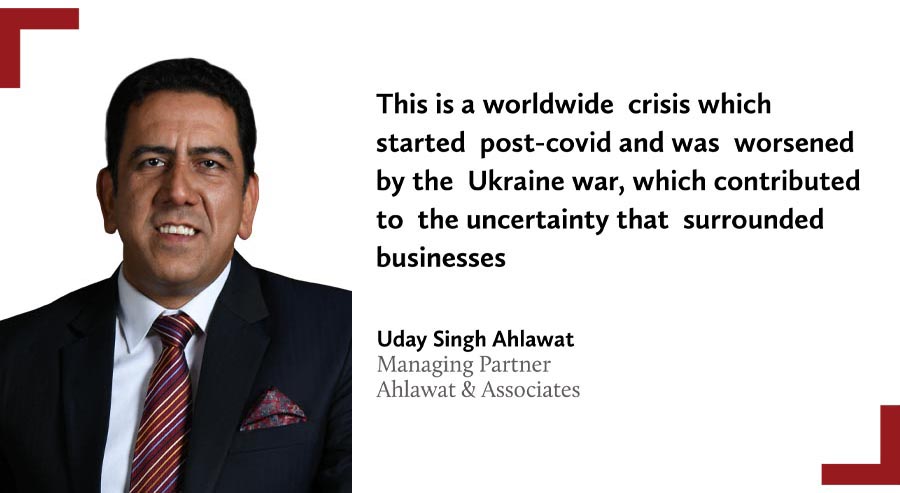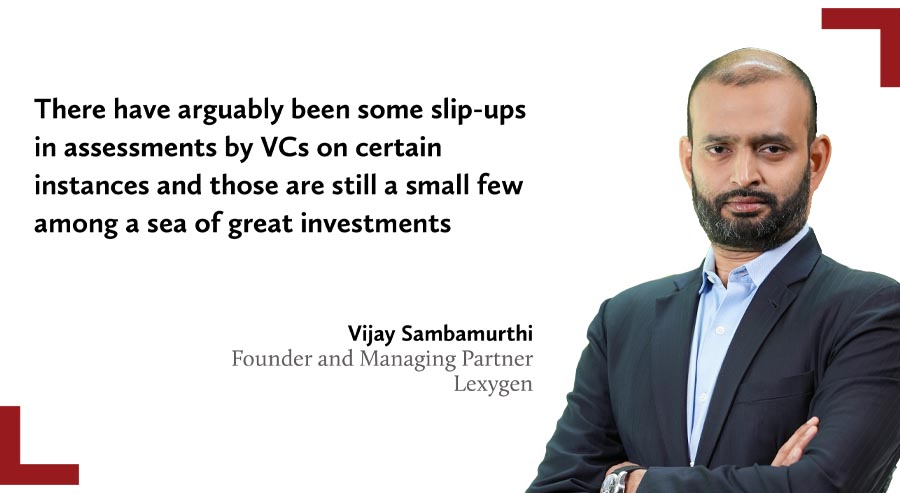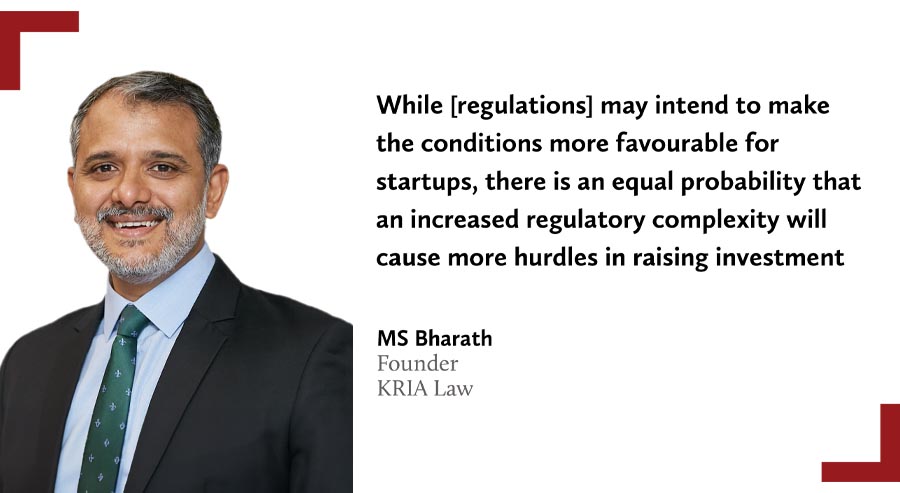Turmoil within high-profile unicorns, a downturn in funding and an investor emphasis on profitability have resulted in a picture for startups that is not so rosy. Indrajit Basu reports
Startups were called “the backbone of new India” by Prime Minister Narendra Modi just last year. Now, some notable startups are struggling to stay afloat, rocked by alleged financial irregularities, lower funding, shrinking valuations and corporate governance lapses.
With 99,000-plus startups and more than 100 billion-dollar unicorns, India has the world’s third-largest startup ecosystem, trailing only the US and China.
However, the harsh reality of 2023 is that excitement around some of India’s promising startups appears to have been misplaced; or, at the very least, exaggerated. In the country’s so called “creator economy”, a slew of startups are struggling to survive, scale up and adjust to changing conditions.
More than 15,000 employees were fired at startups around the country during the first half of 2023, according to Entrackr, a startup-focused media and research organisation. Its Indian Startups Funding Report noted that startups faced a funding winter – just USD6 billion was raised in H1 2023, compared to USD20 billion in the same period last year.
An equally gloomy report has come from Inc42, another startup focused news and research portal. Titled India’s Top 200 Startups Financial Index 2023, Inc42’s report said 55 of 74 unicorns did not turn a profit in FY2022. Some had never turned in a profit and continued to lose millions, even years after their founding.
A casual scan of market news shows major startups striking significant stumbling blocks. There’s delayed financial reporting and the resignation of a statutory auditor (Byju’s); a probe by the Competition Commission of India (Swiggy), and a dispute with the tax authorities worth INR492 million (USD5.9 million) (Pharmeasy’s prized subsidiary, Thyrocare).
Several factors have contributed to the startup sector’s slowdown, and not all of them are India-centric.
“This is a worldwide crisis which started post-covid and was worsened by the Ukraine war, which contributed to the uncertainty that surrounded businesses across the world,” says Uday Singh Ahlawat, managing partner at Ahlawat & Associates in New Delhi. “This impacted investor sentiment as global investors turned cautious and adopted a wait-and-watch to figure where things were headed.”
The covid pandemic has impacted many company supply chains, demand patterns, customer behaviour and business operations, especially those in travel, hotel, retail and entertainment. It has also heightened investor uncertainty and risk aversion.
Then there are the geopolitical tensions and trade battles between major economies. These have impacted cross-border flows of finance, technology, people and data, all of which are critical for startup growth and innovation.
Exacerbating these tensions, India banned some 200 Chinese software applications in 2020-21, citing security and privacy issues. This crippled many startups that relied on these apps for distribution or monetisation.
Changes in regulatory and policy in markets may have also created new problems or opportunities for startups. The EU’s General Data Protection Regulation, for instance, aims to protect personal data and privacy. Its implementation in 2018 increased compliance costs and risks for startups that operate or serve customers in the EU, according to Ahlawat.
Specific to India, Press Note 3 (2020) has been a major blow. This is a directive, issued on 17 April 2020, to curb opportunistic takeovers and acquisitions of Indian companies during the pandemic. It limited foreign direct investment from neighbouring countries and required prior approval for all investments by entities formed in a country that shares a land border with India, or where the beneficial owner of an investment in India is located, or is a citizen.
“Even though the directive was issued with the intent of curtailing any threat to national interest, it also created a hinderance for investment, given that some of the biggest investments in the last few years had come from Chinese investors,” says Ahlawat.
The directive also requires government approval for any transfer of ownership of any current or future foreign direct investment in an entity in India, either directly or indirectly, that would cause the beneficial ownership to fall under the restrictions/scope of the notification.
That has forced investors to rethink their investment plans in the startup sector. Ahlawat says investors are more cautious in their funding selections after several failed IPOs led to a course correction and reduction in valuations.
The funding drought is not only slowing startups, but investors have started demanding startup founders prove the profitability of their ventures from the start.
“Investors are more cautious in funding companies that have not yet demonstrated sustainable profitability,” says Anand Kumar, managing partner at Pier Counsel in Gurugram.
Several macroeconomic factors triggered this investment mood change. The most prominent was an increase in the worldwide cost of capital and interest rates. There has also been a decline in the value of technology companies. Recessions in major economies, such as the US and EU, played a role, as did a slowdown in consumer internet growth.
“Recent unfortunate instances of serious governance lapses in Indian startups” is the other malaise the ecosystem is suffering from, says Vijay Sambamurthi, founder and managing partner of Lexygen in Bengaluru. Take the fate of Zilingo, a promising Singapore-based e-commerce platform with two Indian-origin founders, operations in Southeast Asia and India, and a one-time valuation of almost USD1 billion. Accusations of serious financial irregularities shifted its trajectory from one of global success to the point where its board submitted the company for liquidation in early 2023.
In March 2022, Ashneer Grover, the co-founder and CEO of digital payment solutions startup BharatPe, was accused of “extensive misappropriation of company funds” and siphoning money from the company’s expense account for himself and family members. The company’s board removed Grover from all positions.
Edtech giant Byju’s is a household name for education. Yet, in April this year, it was raided in Bengaluru by Enforcement Directorate officials and summons were issued for founder and CEO Raveendaran Byju. The directorate expressed doubts over the company’s financial records; they had not been released since FY2020-21 and had not been audited, which is mandatory.
In May, the company’s US subsidiary, Alpha, faced a lawsuit from Term Loan B lenders via its agent GLAS Trust Company for allegedly concealing USD533 million in a hedge fund. Later in the same month, media reports revealed that BlackRock had slashed Byju’s valuation from a high of USD22 billion in 2022 to about USD8.2 billion. While the finger of blame is being pointed mostly at startup founders, some people feel that neglect by VCs and funds has also contributed to the present, turbulent times.
Market watchers have criticised VCs for not performing well enough in the way of due diligence or checking the financial accounts and business plans of the businesses they invest in. They are also criticised for overestimating the size and potential of the Indian market, placing excessive pressure on entrepreneurs, and being misled by inflated or fabricated numbers.
“There have arguably been some slip-ups in assessments by VCs on certain instances and those are still a small few among a sea of great investments. The real point is that such periodic blow-ups in the ecosystem are not uncommon, even in Silicon Valley, and these are the ecosystem’s way of cleansing itself,” says Sambamurthi, of Lexygen.
For this reason, it is critical for startups to seek advice and support from mentors, advisers, customers and vendors, says Kumar, of Pier Counsel. He says open and sincere conversations with these stakeholders can considerably help a startup’s success.
“Diversifying funding sources is another strategy to mitigate the risks of a funding downturn. Exploring options like government grants, crowdsourcing or strategic alliances can provide additional financing and support for long-term growth,” he says.
Kumar says authorities like the Reserve Bank of India, the Ministry of Company Affairs (MCA) and income tax authorities should impose stronger policies and implementation and audits to address financial irregularities, lack of forensic auditing and corporate governance issues.
If a startup starts complying with the provisions of the Companies Act, 2013, a significant aspect of financial irregularities would be resolved, he says.
The MCA notification of 1 April 2023, for instance, mandated the implementation of an audit trail in accounting software to track and verify transactions and ensure financial discipline and accountability. Additionally, the MCA made amendments to the Companies (Accounts) Rules, requiring companies to keep electronic records within India, and introducing enhanced disclosures for better oversight on governance.
Yet, while companies should focus on corporate and financial governance, and should adopt appropriate controls to ensure compliance, any clampdown by authorities needs to be lenient in instances where the offence or non-compliance is not extremely critical, says Ahlawat, of Ahlawat & Associates.
He says the priority for every startup is to build a business within its limited resources (finances). Diverting money to engage a skilled legal counsel or a compliance expert is an improbable prospect for startups; thus, the fines in such circumstances should be moderate.
“Any rules or regulations could also be a double-edged sword,” says MS Bharath, founder of KRIA Law in Chennai. “While they may intend to make the conditions more favourable for startups, there is an equal probability that an increased regulatory complexity will cause more hurdles in raising investment, especially from foreign institutional investors.”
According to Sambamurthi, what is required is a harmonious blend of balanced, timely and fair governmental action, as well as a healthy dose of market pressure on companies and investors to conduct business fairly and with good governance.
For example, investors’ increasing demand for ESG-compliant enterprises has produced a huge culture for positive change, he says.
“It is also important for the government to provide founders with the benefit of the doubt, allowing them time to address the challenges they face and comply with necessary regulations,” says Bhushan Shah, a partner at Mansukhlal Hiralal & Co in Mumbai.
Nevertheless, the startup sector has drawn valuable lessons from its travails of the past two years.
For one, startups are expected to have a greater emphasis on distribution and a well-defined “go-to-market”, says Kumar. Additionally, he says startups should aim for modest cash burn, a clear path to profitability, a focus on long-term value creation over short-term ambitions, and a runway of 18 to 24 months. That is, they should be stretching the available cash raised from funding.
Startups are also expected to cut non-core activities that generate expenditures, with the goal of extending their “runway” by at least 12 to 15 months.
Undoubtedly, the Indian startup sector faced losses and hardships in FY2023. Despite these challenges, the sector has demonstrated signs of resilience and innovation. It has also demonstrated its potential and growth prospects for the future.





























